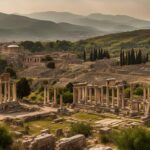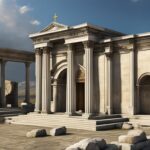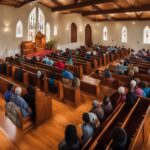Welcome to our in-depth exploration of the history of the 7 churches in Revelation. These ancient churches, mentioned in the Book of Revelation, played a vital role in the early Christian movement. Join us as we delve into their origins, founders, key beliefs, historical significance, denominational splits, leadership and governance, worship practices, contemporary influence, current world membership, and their contribution to the global religious landscape.
Key Takeaways:
- The 7 churches in Revelation were literal churches that existed in Asia Minor during the first century.
- Each church had its own unique characteristics, challenges, and founders.
- The churches’ beliefs and doctrines were shaped by their cultural and historical context.
- The letters addressed to these churches provided guidance, encouragement, and correction.
- The influence of the 7 churches can still be seen in the modern-day Christian Church.
Origins and Founders of the 7 Churches in Revelation
The seven churches in Revelation, mentioned in the biblical book of Revelation, were established by various apostles and early Christian leaders. Each church had its own unique origins and founders, contributing to the diverse tapestry of the early Christian movement.
Ephesus:
The church in Ephesus was founded by the apostle Paul during his missionary journeys. Paul spent a significant amount of time in Ephesus, teaching and establishing a strong Christian community. The church in Ephesus is known for its steadfastness in doctrine but was later rebuked for losing its first love (Revelation 2:1-7).
Smyrna:
The church in Smyrna was led by Polycarp, a disciple of the apostle John. Polycarp was known for his unwavering faith and martyrdom. The church in Smyrna faced persecution but remained faithful to Christ, earning praise from Jesus in the book of Revelation (Revelation 2:8-11).
Pergamos:
The church in Pergamos was located in a city known for its pagan practices and the influence of the Roman Empire. It is believed that the church in Pergamos was founded by the apostle John. This church faced the challenge of false teachings and idolatry, which were prevalent in the city (Revelation 2:12-17).
Thyatira:
The church in Thyatira had trade connections and was founded by an unknown leader. Lydia, one of Paul’s converts, hailed from Thyatira. This church is commended for its love, faith, service, and perseverance. However, it also faced the challenge of tolerating a false prophetess (Revelation 2:18-29).
Sardis:
Sardis was the capital of the ancient Lydian kingdom, and the church in Sardis was founded by early Christian missionaries. The church in Sardis had a reputation for being spiritually dead, lacking genuine faith and works (Revelation 3:1-6).
Philadelphia:
The church in Philadelphia was known for its faithfulness and perseverance in the face of adversity. It was founded by early Christian missionaries and was commended for keeping God’s word and not denying His name (Revelation 3:7-13).
Laodicea:
The church in Laodicea was located in a wealthy city known for its medical school. The church was likely founded by early Christian missionaries. Laodicea is remembered for its lukewarm faith, leading Jesus to rebuke the church for its spiritual apathy (Revelation 3:14-22).
These churches, with their diverse origins and founders, provide valuable insight into the early Christian movement and the challenges faced by believers in the first century.
Key Beliefs and Doctrines of the 7 Churches in Revelation
The seven churches in Revelation each had their own distinct set of key beliefs and doctrines that shaped their faith and practices. These beliefs were rooted in the teachings of Jesus Christ and the apostles, but were also influenced by the cultural and historical context of each church. While there were variations among the churches, there were some common themes that emerged.
Ephesus: Love and Perseverance
Ephesus placed a strong emphasis on love and perseverance. The church believed in the importance of loving one another and demonstrating this love through practical acts of kindness and service. They also believed in the need to persevere in their faith despite challenges and trials.
Smyrna: Endurance and Faithfulness
Smyrna focused on endurance and faithfulness. The church encouraged its members to remain steadfast in their faith, even in the face of persecution and suffering. They believed that their ultimate reward was eternal life with Christ.
Pergamos: Discernment and Truth
Pergamos valued discernment and truth. The church recognized the importance of discerning false teachings and holding fast to the truth of the Gospel. They believed in the need for spiritual discernment and careful study of Scripture to avoid being led astray.
Thyatira: Holiness and Accountability
Thyatira emphasized holiness and accountability. The church believed in living a life of purity and righteousness, striving to be obedient to God’s commands. They also emphasized the importance of mutual accountability within the body of believers.
Sardis: Wakefulness and Repentance
Sardis emphasized the need for wakefulness and repentance. The church called its members to be spiritually awake and vigilant, avoiding complacency and spiritual lethargy. They believed in the importance of genuine repentance and turning away from sin.
Philadelphia: Faithfulness and Open Doors
Philadelphia focused on faithfulness and open doors. The church believed in remaining faithful to God’s Word and promises. They also believed in the opportunities and open doors that God provides for spreading the Gospel and advancing His kingdom.
Laodicea: Lukewarmness and Zeal
Laodicea grappled with the issue of lukewarmness and the need for zeal. The church was rebuked for its spiritual indifference and lack of passion for God. They were called to be zealous and fervent in their love for God and in their service to Him.
Overall, the key beliefs and doctrines of the seven churches in Revelation emphasized the importance of love, perseverance, endurance, faithfulness, discernment, truth, holiness, accountability, wakefulness, repentance, faithfulness, open doors, and zeal. These core values continue to shape the beliefs and practices of Christians today.
Historical Significance of the 7 Churches in Revelation
The seven churches mentioned in the book of Revelation hold significant historical importance in the development of early Christianity. These churches, Ephesus, Smyrna, Pergamos, Thyatira, Sardis, Philadelphia, and Laodicea, were not only places of worship but also served as centers for community and outreach in their respective regions.
The letters addressed to these churches by the apostle John provide valuable insights into the challenges and triumphs of the early Christian movement. These letters offer guidance, encouragement, and correction, which played a crucial role in shaping the beliefs and practices of the early Church.
The historical significance of these churches lies in their representation of various characteristics and challenges faced by the early Christian communities. Each church’s unique context, struggles, and strengths serve as valuable lessons for believers today. Throughout history, the examples set by these churches have inspired and guided generations of Christians in their faith and commitment to Jesus Christ.
| Church | Significance |
|---|---|
| Ephesus | The church known for its perseverance, but also warned against losing its first love. |
| Smyrna | The church that faced persecution, but remained faithful even in the face of death. |
| Pergamos | The church located in a city known for its idolatry and false teachings. |
| Thyatira | The church that tolerated false prophets and immorality in its midst. |
| Sardis | The church with a reputation for being alive, but actually spiritually dead. |
| Philadelphia | The church that remained faithful and received commendation. |
| Laodicea | The church known for its lukewarmness and self-sufficiency. |
The historical significance of the seven churches in Revelation extends beyond the first century. Their experiences and teachings continue to resonate with believers today, reminding them of the importance of faithfulness, perseverance, and the need to remain steadfast in the face of cultural pressures and challenges.
Denominational Split and Schisms in the 7 Churches in Revelation
Throughout history, the seven churches mentioned in Revelation experienced divisions and schisms. These splits were often the result of theological differences, conflicts over leadership, or cultural influences. While the exact details and extent of these divisions may vary among different historical sources, they are significant in understanding the development of Christianity.
One notable example is the split between the Eastern Orthodox Church and the Roman Catholic Church, which can trace its origins back to the theological differences between the churches of Constantinople (modern-day Istanbul) and Rome. The theological dispute over the nature of the Holy Spirit led to the Great Schism of 1054, officially dividing the Eastern and Western branches of Christianity.
“The schism between the Eastern and Western churches was not limited to theological disagreements, but also involved political and cultural factors. The rise of the Byzantine Empire in the East and the Roman Empire in the West further exacerbated the tensions between the two churches.”
In addition to the East-West divide, there were numerous other schisms and divisions within the seven churches. For example, the Protestant Reformation in the 16th century led to the formation of various Protestant denominations, each with their own distinct beliefs and practices. These denominational splits were influenced by factors such as disagreements over sacraments, church hierarchy, and the authority of scripture.
Despite these divisions, it is important to note that there are also efforts towards unity and reconciliation among the churches. Ecumenical movements seek to foster dialogue and understanding between different Christian traditions, with the aim of promoting greater unity and cooperation.
| Denomination | Key Points of Split |
|---|---|
| Eastern Orthodox Church | Theological differences with the Roman Catholic Church, iconoclasm debates, and political conflicts. |
| Roman Catholic Church | Theological differences with the Eastern Orthodox Church, the authority of the Pope, and the Filioque controversy. |
| Protestant Churches | Theological differences with the Roman Catholic Church, rejection of certain Catholic doctrines, and emphasis on individual interpretation of scripture. |
Leadership and Governance of the 7 Churches in Revelation
The leadership and governance of the seven churches mentioned in Revelation varied in structure and authority. Each church had its own hierarchy, consisting of leaders such as bishops, elders, and deacons. These leaders were responsible for the spiritual guidance, administration, and oversight of the church community.
In some churches, the role of the bishop was central and held significant authority. The bishop was responsible for the overall governance and direction of the church, ensuring the adherence to sound doctrine and the well-being of the congregation. Bishops were chosen based on their spiritual maturity, knowledge of scripture, and ability to provide pastoral care.
Alongside the bishops, elders and deacons played important roles in the governance of the churches. Elders were responsible for providing wisdom, pastoral care, and guidance to the congregation, while deacons served in practical ministry roles, ensuring the smooth functioning of the church community.
“Let the elders who rule well be considered worthy of double honor, especially those who labor in preaching and teaching.” – 1 Timothy 5:17
Table: Leadership Roles in the 7 Churches
| Church | Leadership Roles |
|---|---|
| Ephesus | Bishop, Elders, Deacons |
| Smyrna | Bishop, Elders, Deacons |
| Pergamos | Bishop, Elders, Deacons |
| Thyatira | Bishop, Elders, Deacons |
| Sardis | Bishop, Elders, Deacons |
| Philadelphia | Bishop, Elders, Deacons |
| Laodicea | Bishop, Elders, Deacons |
The selection and appointment of leaders varied among the churches, with some leaders being chosen by the congregation, while others were appointed by apostles or existing church leaders. Regardless of the specific leadership structure, the primary focus of these leaders was to guide the church in upholding the teachings of Jesus, nurturing the spiritual growth of believers, and ensuring the unity and well-being of the church community.
Worship Practices of the 7 Churches in Revelation
The worship practices of the seven churches in Revelation were varied and reflected the cultural and religious context of the time. Each church had its own unique traditions and rituals, influenced by both Jewish and Greco-Roman customs. Worship was an integral part of the Christian community, offering believers a way to express their faith, seek spiritual guidance, and commune with God.
In Ephesus, the believers gathered for communal prayers, hymn singing, and the reading and teaching of scriptures. The church in Smyrna emphasized the importance of martyrdom and remained steadfast in their faith despite persecution. Pergamos, known for its strong influence in the Roman empire, continued to incorporate elements of Roman paganism into their worship practices, which became a point of contention and correction in the letter addressed to them.
Thyatira, a city known for its trade connections, had a fervent community that engaged in acts of service and charity. Sardis, the capital of the Lydian kingdom, practiced solemn and formal worship, with a focus on maintaining external appearances. Philadelphia, famous for its grapes and textiles, had a vibrant community that emphasized brotherly love and unity. In Laodicea, a wealthy city known for its medical school, the believers were criticized for their lukewarm devotion and materialistic mindset.
Table: Worship Practices of the 7 Churches in Revelation
| Church | Worship Practices |
|---|---|
| Ephesus | Communal prayers, hymn singing, reading and teaching of scriptures |
| Smyrna | Emphasis on martyrdom, steadfastness in faith |
| Pergamos | Incorporation of Roman pagan customs |
| Thyatira | Acts of service, charity |
| Sardis | Solemn and formal worship |
| Philadelphia | Emphasis on brotherly love, unity |
| Laodicea | Critiqued for lukewarm devotion and materialistic mindset |
“Let the one who has an ear, hear what the Spirit says to the churches.” – Revelation 2:7
These worship practices serve as a glimpse into the diverse expressions of faith within the early Christian Church. They highlight the challenges and strengths of each congregation and provide insights into the theological, cultural, and historical factors that shaped their worship traditions. While the specific practices may have evolved over time, the importance of communal worship and spiritual devotion continues to be emphasized in Christian communities today.
The worship practices of the seven churches in Revelation remind us of the rich heritage and vibrant diversity of Christian worship. They encourage believers to reflect on their own worship practices and consider how they can cultivate a deeper connection with God and their fellow believers. Through prayer, scripture, sacraments, and acts of service, Christians today can continue the legacy of the early churches and seek to worship God in spirit and in truth.
Contemporary Influence of the 7 Churches in Revelation
The seven churches mentioned in Revelation continue to have a significant influence on the modern-day Christian Church. Their stories, teachings, and warnings provide valuable insights and lessons for believers today. Understanding the contemporary influence of these churches helps us navigate the challenges and opportunities of our time while staying rooted in the principles of faith.
Key Beliefs and Doctrines
- Ephesus: Known for their love for the truth and their perseverance, emphasizing the importance of remaining steadfast in faith.
- Smyrna: Known for enduring persecution and facing hardship with unwavering faith, teaching us the value of resilience and trust in God.
- Pergamos: Known for their refusal to compromise their faith, reminding us to stand firm in our convictions and resist worldly temptations.
- Thyatira: Known for their commitment to good deeds and service, inspiring us to live out our faith through acts of love and kindness.
- Sardis: Known for their need to wake up and strengthen what remains, urging us to examine our spiritual lives and pursue genuine transformation.
- Philadelphia: Known for their faithfulness and perseverance, encouraging us to hold fast to God’s promises and remain steadfast in our devotion.
- Laodicea: Known for their lukewarm faith and self-sufficiency, warning us against complacency and urging us to pursue genuine passion and commitment in our relationship with God.
Leadership and Governance
The leadership and governance structures of the seven churches in Revelation varied, with each church having its own hierarchy of leaders. Bishops, elders, and deacons played vital roles in providing spiritual guidance and administration. The diverse leadership models observed in these churches provide a valuable framework for modern-day churches to develop effective leadership structures that align with their unique contexts and needs.
“Let him who has an ear, hear what the Spirit says to the churches.” – Revelation 3:22
This quote from the book of Revelation reminds us of the timeless relevance of the messages addressed to the seven churches. They are not merely historical accounts but serve as divine instructions for the church today. The contemporary influence of these churches can be seen in the practices, teachings, and ethos of churches worldwide, as they seek to embody the virtues, correct the shortcomings, and follow the call to faithful discipleship.

| Church | Contemporary Influence |
|---|---|
| Ephesus | Emphasizing the importance of sound doctrine and discernment in the face of false teachings. |
| Smyrna | Inspiring believers to stand strong in the face of persecution and adversity. |
| Pergamos | Encouraging believers to resist compromise and remain faithful to God’s Word. |
| Thyatira | Highlighting the value of good works and service in the Christian life. |
| Sardis | Exhorting believers to examine their spiritual lives and pursue genuine transformation. |
| Philadelphia | Urging believers to hold fast to God’s promises and remain faithful in times of challenge. |
| Laodicea | Warning against spiritual complacency and calling for genuine passion and devotion to God. |
Current World Membership of the 7 Churches in Revelation
The current world membership of the seven churches mentioned in Revelation is challenging to determine precisely. However, Christianity as a whole has experienced significant growth and spread worldwide since the time of these churches. Today, there are millions of Christians globally who identify with the teachings and beliefs of the early Christian Church.
The membership of these churches varies across different regions and denominations. While some churches, such as the Church of Ephesus, have a historical connection to their biblical counterparts, others may have emerged later and may not directly trace their lineage back to the original churches in Asia Minor. Nevertheless, the impact of these seven churches on the global Christian community cannot be understated.
As Christianity has expanded and evolved over the centuries, countless denominations, sects, and traditions have emerged. Each of these groups has its own unique interpretation of scripture and theological perspectives. While not all Christian denominations specifically identify as one of the seven churches in Revelation, many draw inspiration from their teachings and incorporate them into their doctrinal beliefs and practices.
| Church | Current World Membership |
|---|---|
| Ephesus | Estimated millions |
| Smyrna | Estimated millions |
| Pergamos | Estimated millions |
| Thyatira | Estimated millions |
| Sardis | Estimated millions |
| Philadelphia | Estimated millions |
| Laodicea | Estimated millions |
While it is challenging to obtain precise statistics on the current world membership of the seven churches in Revelation, their influence and impact continue to shape the global Christian landscape. As believers around the world strive to follow the teachings of Jesus and remain faithful to Him, the legacy of these early churches remains a vital part of the Christian faith.
Inclusion of the 7 Churches in Revelation in World Religions
The seven churches mentioned in Revelation hold a significant place in the history of Christianity. While they represent a small percentage of the world’s religious population, their inclusion in world religions cannot be overlooked. These churches played a crucial role in the development and spread of Christianity during the early centuries, shaping the beliefs and practices of millions of believers worldwide.
Despite their relatively small size in comparison to other religious groups, the impact of the seven churches in Revelation extends far beyond numerical figures. Their historical significance resonates throughout the Christian faith, and their teachings continue to inspire and guide believers in their spiritual journeys.
To gain a better understanding of the inclusion of these churches in world religions, it is important to explore their origins, key beliefs and doctrines, historical significance, denominational splits, leadership and governance, worship practices, and contemporary influence. By examining each of these aspects, we can appreciate the enduring legacy and influence of the seven churches in Revelation on the broader scope of Christianity.
Table: Comparison of World Religions and the 7 Churches in Revelation
| Religion | Number of Adherents | Percentage of World Religions | Inclusion of the 7 Churches in Revelation |
|---|---|---|---|
| Christianity | 2.5 billion | 31.1% | The seven churches in Revelation hold a significant place in Christianity, influencing its teachings and practices. |
| Islam | 1.8 billion | 24.1% | While the seven churches in Revelation are not directly relevant to Islam, they have shaped the historical context of their interactions. |
| Hinduism | 1.2 billion | 15.2% | The teachings and practices of the seven churches in Revelation are not part of Hinduism. |
| Buddhism | 500 million | 6.7% | The seven churches in Revelation do not have a direct influence on Buddhism. |
| Judaism | 14 million | 0.2% | The seven churches in Revelation are not part of Judaism but are historically connected through early Christianity. |
Conclusion
The history of the seven churches in Revelation provides a fascinating glimpse into the early Christian movement. These churches, namely Ephesus, Smyrna, Pergamos, Thyatira, Sardis, Philadelphia, and Laodicea, played a pivotal role in shaping the development and spread of Christianity in the first century.
Each church had its own unique characteristics and challenges, reflecting the diverse cultural and historical context of their respective regions. The letters addressed to these churches in the book of Revelation provided guidance, encouragement, and correction, offering valuable insights into their beliefs and practices.
Over time, these churches experienced divisions and schisms, leading to the formation of different Christian denominations with varying interpretations of scripture. Despite these divisions, the influence of the seven churches can still be seen in the modern-day Christian Church, as believers continue to draw inspiration from their examples, teachings, and warnings.
While it is difficult to determine the exact current world membership of these seven churches, Christianity as a whole has grown and spread globally since their existence. Although they represent a small percentage of the world’s religious population, their impact on the development of Christianity is profound.
FAQ
Were the seven churches in Revelation real churches?
Yes, the seven churches mentioned in Revelation were actual churches that existed in Asia Minor during the first century.
What were the names of the seven churches in Revelation?
The seven churches were Ephesus, Smyrna, Pergamos, Thyatira, Sardis, Philadelphia, and Laodicea.
Who founded these churches?
Various apostles and early Christian leaders established the seven churches. Paul founded the church in Ephesus, while Polycarp was the bishop of Smyrna.
What were the unique characteristics and challenges of each church?
Each church had its own distinct traits and struggles, depending on their location and historical context. Ephesus had lost its first love, Smyrna faced persecution, Pergamos had false teachings, Thyatira tolerated immorality, Sardis had a reputation for being alive but was spiritually dead, Philadelphia was faithful amidst opposition, and Laodicea was lukewarm and self-sufficient.
What were the key beliefs and doctrines of the seven churches?
Each church had its own set of beliefs based on their understanding of the teachings of Jesus and the apostles. These doctrines varied and were influenced by the cultural and historical context of each church.
What was the historical significance of the seven churches in Revelation?
The seven churches played a crucial role in the early Christian movement, serving as centers of worship, community, and outreach. The letters to these churches provided guidance and correction, shaping the development of the early Christian Church.
Did the seven churches experience divisions and schisms?
Yes, over time, the churches mentioned in Revelation experienced splits caused by theological differences, leadership conflicts, or cultural influences. Some of these divisions led to the formation of different Christian denominations.
What was the leadership and governance structure of the seven churches in Revelation?
Each church had its own hierarchy, with leaders such as bishops, elders, and deacons. The selection and role of leaders varied among the churches.
What were the worship practices of the seven churches in Revelation?
The worship practices included prayers, hymns, reading and teaching from scripture, partaking in the Eucharist or Lord’s Supper, and baptism. These practices were influenced by Jewish traditions and Greco-Roman culture.
How do the seven churches in Revelation influence the modern Christian Church?
Many churches today draw inspiration from the examples, teachings, and warnings given to the seven churches. The struggles faced by the early Christians are relevant to believers today.
What is the current world membership of the seven churches in Revelation?
It is difficult to determine the exact current membership of the seven churches mentioned in Revelation. However, Christianity as a whole has grown and spread worldwide since their time.
What percentage of the world’s religious population do the seven churches in Revelation account for?
The seven churches represent a small percentage of the world’s religious population. However, their influence extends beyond numbers and has had a profound impact on the development of Christianity.
What is the conclusion of the history of the seven churches in Revelation?
The history of the seven churches is a rich and complex topic. These churches played a significant role in the early Christian movement, and their struggles, triumphs, and teachings continue to inspire and guide believers today.
















